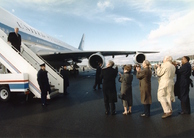|
Political Science
Page 28/33 | Showing results 406 - 420 of 493
2010, Vol. 2 No. 06
President George Bush came into office in 2001 after both a campaign and outcome that shook the nation. Following the controversial Presidential election results, George W. Bush promised the American people that he was the right person to do this... Read Article »
2010, Vol. 2 No. 06
Conflict management in the Horn of Africa has been relatively unsuccessful. Foreign colonialism created boundaries that have yet to be resolved, and newly independent nations engaged in conflicts responsible for human rights atrocities, child conscription... Read Article »
2010, Vol. 2 No. 06
In his eight years as President, George W. Bush appointed two Supreme Court justices, 61 Appeals Court judges, and 261 Federal District Court judges. This article examines his appeals court nominations. Specifically it looks at eleven of the most... Read Article »
2010, Vol. 2 No. 06
Martin Luther King, Jr. once wrote that “to ignore evil is to become an accomplice to it.”[1] Although this statement was meant towards the civil rights movement, the idea equally applies in other instances, especially in times... Read Article »
2010, Vol. 2 No. 05
Power is the ability to achieve one’s purposes or goals.[1] Through the scholarship of Joseph Nye, the concept of power occupies two distinct spheres: ‘hard’ and ‘soft’. The former purports to have a coercive function... Read Article »
2010, Vol. 2 No. 05
To understand an administration, you need to understand the key players. Through analyzing the Bush presidency, it is clear that the agenda was constructed and shaped by more than just one man. The President’s choice for executive cabinet... Read Article »
2010, Vol. 2 No. 05
For most Americans, 9/11 represents a turning point for our country. It is the beginning of a new chapter in our relations to the world and how we view our place in it. It is the beginning of a chapter where the American commitment to human rights... Read Article »
2010, Vol. 2 No. 05
Long held as one of the most prized executive powers, the presidential veto in American politics grants the sitting president the power to unilaterally halt any piece of legislation. Though the word “veto” does not appear anywhere in... Read Article »
2010, Vol. 2 No. 05
On January 20, 2001, George W. Bush was sworn into office as America’s 43rd President. Bush stood out amongst his 42 predecessors as the country’s first President to hold a Masters Degree in Business Administration.[1] This degree was... Read Article »
2010, Vol. 2 No. 05
In this chapter, we will be observing the extent to which our 43rd President upheld his 2000 campaign promise to be a compassionate conservative. When observing George W. Bush’s “compassionate conservatism,” I will be constraining... Read Article »
2010, Vol. 2 No. 05
Now that President George W. Bush has completed his two terms in office, it is only natural that political scientists and historians are in the process of completing retrospective analyses of the last eight years of leadership under the Republican... Read Article »
2010, Vol. 2 No. 04
Brazil’s northeast coast has a perfect climate for a booming tourism industry. The beaches are unspoiled, the people are friendly, and the area required only a small amount of infrastructure development to create a haven for tourists. While... Read Article »
2010, Vol. 2 No. 04
The year 1993 was not a good one for Bill Clinton. An exception, perhaps, being the morning of January 20th when he stood at the west front of the United States Capitol building and took the Oath of Office to become the forty- second President of... Read Article »
2010, Vol. 3 No. 2
"Our forces were vastly superior to the rebels. Then why couldn't we finish with them quickly? Because they managed to mobilize the population through terror and persuasion. It was therefore imperative that we isolate the rebels from the population... Read Article »
2010, Vol. 3 No. 2
Colonel William Way is a USAR officer. He received a direct commission in the Army Judge Advocate General's Corps in 1990. Colonel Way earned a BS in Economics from the Wharton School, University of Pennsylvania, in 1983, a JD from Hastings College... Read Article »

Expedited Article Review
Submit an article and get a decision fast.
If you need a fast decision, INQUIRIES Journal offers expedited processing of your submission for a small fee. Depending on the expedited review option you choose, you can receive a decision in as few as 5-days.
In addition to a shorter review period, the fee supports the journal's continued operation and open-access publishing model. Standard submissions are always free. Submit Now » - Submit an Article to Inquiries Journal -
|






